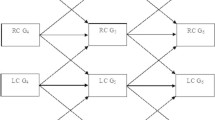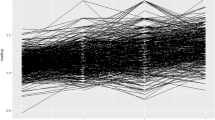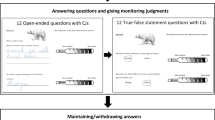Abstract
The aim of this study was, firstly, to explore the development of primary school children’s metacognitive knowledge from preschool to the 2nd grade and the development of their text comprehension skill from the 1st grade to the 3rd grade. Secondly, the developmental dynamics between metacognitive knowledge (MCK) and text comprehension skill (CS) across the first three school years were investigated. The longitudinal sample included 181 children who were tested three times from preschool spring to the spring term of the 3rd grade using an identical set of measurements: the Metacognitive Knowledge Test and Listening and Reading Comprehension Tests. In studying developmental change using Latent Growth Curve modelling (LGC), no uni-construct effect for the development of MCK or for text CS was found. However, a slight multi-construct cumulative development between the children’s MCK and reading CS was identified. Thus, it could be cautiously interpreted that the more the children’s MCK developed from preschool to the end of the 2nd grade, the better reading CS they showed during the first three school years.



Similar content being viewed by others
Notes
The means and standard deviations of each measure in each measurement point and sample sizes of the present and the original samples are shown in the Appendix.
References
Afflerbach, P. (2002). Teaching reading self-assessment strategies. In C. Block & M. Pressley (Eds.), Comprehension instruction: Research-based best practices (pp. 96–111). New York: Guilford Press.
Alexander, J. M., Carr, M., & Schwanenflugel, P. J. (1995). Development of metacognition in gifted children: Directions for future research. Developmental Review, 15, 1–37.
Alexander, J., & Schwanenflugel, P. (1994). Strategy regulation: The role of intelligence, metacognitive attributions, and knowledge base. Developmental Psychology, 30, 709–723.
Annevirta, T., & Vauras, M. (2001). Metacognitive knowledge in primary grades: a longitudinal study. European Journal of Psychology of Education, 16, 257–282.
Annevirta, T., & Vauras, M. (2006). Developmental changes of metacognitive skill in elementary school children. Journal of Experimental Education, 74, 197–225.
Astington, J. W. (1993). The child’s discovery of mind. Cambridge, MA: Harvard University Press.
Aunola, K., Leskinen, E., Lerkkanen, M.-K., & Nurmi, J.-E. (2004). Developmental dynamics of math performance from preschool to grade 2. Journal of Educational Psychology, 96, 699–713.
Aunola, K., Leskinen, E., Onatsu-Arvilommi, T., & Nurmi, J-E. (2002). Three methods for studying developmental change: A case of reading skill and self-concept. British Journal of Educational Psychology, 72, 343–364.
Baker, L. (1996). Social influences on metacognitive development in reading. In C. Cornoldi & J. Oakhill (Eds.), Reading comprehension difficulties. Processes and interventions (pp. 331–351). Mahwah, NJ: Erlbaum.
Baker, L. (2002). Metacognition in comprehension instruction. In C. C. Block & M. Pressley (Eds.), Comprehension Instruction: Research-based best practices (pp. 77–95). New York: Guilford Press.
Baker, L., & Brown, A. L. (1984). Cognitive monitoring in reading. In J. Flood (Ed.), Understanding reading comprehension: Cognition, language, and the structure of prose (pp. 21–44). Newark, DE: International Reading Association.
Bast, J., & Reitsma, P. (1998). Analyzing the development of individual differences in terms of Matthew effects in reading: Results from a Dutch longitudinal study. Developmental Psychology, 34, 1373–1399.
Borkowski, J. G., & Kurtz, B. E. (1987). Metacognition and cognitive control. In J. G. Borkowski & J. D. Day, (Eds.), Cognition in special children: Comparative approaches to retardation, learning disabilities, and giftedness (pp. 123–152). Norwood, NJ: Ablex.
Borkowski, J. G., Schneider, W., & Pressley, M. (1989). The challenges of teaching good information processing to learning disabled students. International Journal of Disability, Development and Education, 36, 169–185.
Bransford, J. D., Brown, A. L., & Cocking, R. R. (2004) (Eds.). Miten opimme. Aivot, mieli, kokemus ja koulu [How People Learn. Brain, Mind, Experience and School]. Juva: WSOY.
Brown, A. L. (1987). Metacognition, executive control, self-regulation, and other more mysterious mechanisms. In F. Weinert & R. Kluwe (Eds.), Metacognition, motivation and understanding (pp. 65–116). Hillsdale, NY: Erlbaum.
Brown, A. L. (1997). Transforming schools into communities of thinking and learning about series matters. American Psychologist, 4, 399–413.
Brown, A. L., Bransford, J. D., Ferrara, R. A., & Campione, J. C. (1983). Learning, remembering and understanding. In J. H. Flavell & E. M. Markman (Eds.), Handbook of child psychology: Vol. 3 cognitive development (4th ed.) (pp. 78–166). NY: Wiley.
Brown, A. L., Campione, J. C., & Day, J. D. (1981). Learning to learn: On training students to learn from texts. Educational Researcher, 2, 14–21.
Brown, R., & Pressley, M. (1994). Self-regulated reading and getting meaning from text: The transactional strategy instruction model and its ongoing validation. In D. H. Schunk & B. J. Zimmerman (Eds.) Self-regulation of learning and performance: Issues and educational applications (pp. 155–179). Hillsdale, NJ: Erlbaum.
Cain, K., & Oakhill, J. (1999). Inference making ability and its relation to comprehension failure in young children. Reading and Writing: An Interdisciplinary Journal, 11, 489–503.
Case, L. P., Harris, K. R., & Graham, S. (1992). Improving the mathematical problem solving skill of students with learning disabilities: Self-regulated strategy development. Journal of Special Education, 26, 1–19.
Collins, A., Brown, J., & Newman, S. (1989). Cognitive apprenticeship: Teaching the craft of reading, writing, and mathematics. In L. Resnick (Ed.), Knowing, learning and instruction (pp. 453–494). Hillsdale, NJ: Erlbaum.
Cross, D. R., & Paris, S. G. (1988). Developmental and instructional analyses of children’s metacognition and reading comprehension. Journal of Educational Psychology, 80, 131–142.
De Corte, E., Verschaffel, L., & Van De Ven, A. (2001). Improving text comprehension strategies in upper primary school children: A design experiment. British Journal of Educational Psychology, 71, 531–559.
De Jong, P. F., & Van der Leij, A. (2002). Effects of phonological abilities and linguistic comprehension on the development of reading. Scientific Studies of Reading, 6, 51–77.
Dufva, M., Niemi, P., & Voeten, M. (2001). The role of phonological memory, word recognition, and comprehension skills in reading development: from preschool to grade 2. Reading and Writing: An Interdisciplinary Journal, 14, 91–117.
Dufva, M., & Voeten, M. (1999). Native language literacy and phonological memory as prerequisites for learning English as a foreign language. Applied Psycholinguistics, 20, 248–329.
Flavell, J. H. (1976). Metacognitive aspects of problem solving. In L. B. Resnick (Ed.), The nature of intelligence (pp. 231–235). Hillsdale, NJ: Erlbaum.
Flavell, J. H.(1988). The development of children´s knowledge about the mind. In J. W. Astington, P. L. Harris & R. O. Olson (Eds.), Developing theories of mind (pp. 244–267). Cambridge: University Press.
Flavell, J. H., Green, F. L., & Flavell, E. R. (1995). Young children’s knowledge about thinking. Monographs of the society for research in child development, 60, No1.
Garner, R. (1987). Strategies for reading and studying expository text. Educational Psychologist, 22, 299–312.
Gaskins, I. W. (1996). Classroom applications of cognitive science: Teaching poor readers how to learn, think, and problem solve. In K. Macgilly (Ed.), Classroom lessons: Integrating cognitive theory and classroom practice (pp. 129–154). Cambridge, MA: MIT Press/Bradford Books.
Graesser, A. C., Swamer, S. S., Baggett, W., & Sell, M. A. (1996). New models in deep comprehension. In B. K. Britton & A. C. Graesser (Eds.), Models of understanding text (pp. 1–32). Hillsdale, NJ: Erlbaum.
Guthrie, J., & Wigfield, A. (1999). Reading engagement: Motivating readers through integrated instruction. Newark, DE: International Reading Association.
Hacker, D. J. (1998). Self-regulated comprehension during normal reading. In J. H. Hacker, J. Dunlosky & A. C. Graesser (Eds.), Metacognition in educational theory and practice (pp. 165–191). Mahwah, NJ: Erlbaum.
Hannah, C. L., & Shore, B. M. (1995). Metacognition and high intellectual ability: Insights from the study of learning-disabled gifted students. Gifted Child Quarterly, 39, 95–109.
Hoyle, R. H., & Panter, A. T. (1995). Writing about structural equation models. In R. H. Hoyle (Ed.), Structural equation modeling (pp. 158–176). Thousand Oaks: Sage.
Hu, L., & Bentler, P. M. (1999). Cutoff criteria for fit indexes in covariance structure analysis: Conventional criteria versus new alternatives. Structural Equation Modeling, 6, 1–55.
Jöreskog, K. G., Sörbom, D., du Toit, S., & du Toit, M. (1999). LISREL 8: New statistical features. Chicago, IL: Scientific Software International.
Juel, C. (1988). Learning to read and write: A longitudinal study of 54 children from first through fourth grades. Journal of Educational Psychology, 80, 437–447.
Kinnunen, R., Vauras, M., & Niemi, P. (1998). Comprehension monitoring in beginning readers. Scientific Studies of Reading, 4, 353–375.
Leppänen, U., Niemi, P., Aunola, K., & Nurmi, J.-E. (2004). Development of reading skills among preschool and primary school pupils. Reading Research Quarterly, 39, 72–93.
Lerkkanen, M.-K., Rasku-Puttonen, H., Aunola, K., & Nurmi, J. E. (2004). Reading performance and its developmental trajectories during the fist and the second grade. Learning and Instruction, 14, 111–130.
Lie, S., & Linnakylä, P. (2004). Nordic PISA 2000 in a sociocultural perspective. Scandinavian Journal of Educational Research, 48, 227–230.
Linnakylä, P., Malin, A., & Taube, K. (2004). Factors behind low reading literary achievement. Scandinavian Journal of Educational Research, 48, 231–249.
Mayer, R. E. (2004). Teaching of subject matter. Annual Review of Psychology, 55, 715–744.
Melot, A.-M. (1998). The relationship between metacognitive knowledge and metacognitive experiences: Acquisition and re-elaboration. European Journal of Psychology of Education, 13, 75–89.
Meloth, M. S. (1990). Changes in poor readers’ knowledge of cognition and the association of knowledge of cognition with regulation of cognition and reading comprehension. Journal of Educational Psychology, 82, 792–798.
Miller, P. H. (1994). Individual differences in children’s strategic behaviours: Utilization deficiencies. Learning and Individual Differences, 6, 285–307.
Paris, S., Lipson, M. Y., & Wixson, K. (1983). Becoming strategic reader. Contemporary Educational Psychology, 8, 293–316.
Paris, S. G., & Newman, R. S. (1990). Developmental aspect of self-regulated learning. Educational Psychologist, 25, 87–102.
Paris, S. G., & Oka, E. R. (1986). Children’s reading strategies, metacogntion and motivation. Developmental Review, 6, 25–56.
Paris, S. G., & Oka, E. R. (1989). Strategies for comprehending text and coping with reading difficulties. Learning Disability Quarterly, 12, 32–42.
Paris, S. G., & Winograd, P. (1990). How metacognition can promote academic learning and instruction. In B. F. Jones & L. Idol (Eds.), Dimensions of thinking and cognitive instructions (pp. 15–51). Hillsdale: NJ: Erlbaum.
Perry, N. (1998). Young children’s self-regulated learning and contexts that support it. Journal of Educational Psychology, 90, 715–729.
Perry, N. E., VandeKamp, K. J. O., Mercer, L. K., & Nordby, C. J. (2002). Investigating teacher–student interactions that foster self-regulated learning. Educational Psychologist, 37, 5–15.
Poskiparta, E., Vauras, M., & Niemi, P. (1998). Promoting reading skills in a computer-based training program. In P. Reitsma & L. Verhoeven (Eds.), Problems and interventions in literacy development (pp. 335–348). Netherlands: Kluwer.
Pressley, M. (2002). Comprehension strategies instruction. In C. C. Block & M. Pressley (Eds.), Comprehension instruction: Research-based best practices (pp. 11–27). New York: Guilford Press.
Pressley, M., & Afflerbach, P. (1995). Verbal protocols of reading: The nature of the constructively responsive reader. Hillsdale, NJ: Erlbaum.
Pressley, M., Borkowski, J. G., & Schneider, W. (1989). Good information processing: What it is and how education can promote it. International Journal of Educational Research, 13, 857–867.
Pressley, M., & Gaskins, I. (2006). Metacognitively competent reading comprehension is constructively responsive reading: How can such reading be developed in students? Metacognition and Learning, 1, 99–113.
Pressley, M., & Ghatala, E. S. (1990). Self-regulated learning: Monitoring learning from text. Educational Psychologist, 25, 19–33.
Pressley, M., Hogan, K., Wharton-McDonald, R., Mistretta, J., & Ettenberger, S. (1996). The challenges of instructional scaffolding: The challenges of instruction that supports student thinking. Learning Disabilities Research and Practice, 11, 138–146.
Rubman, C. N., & Waters, H. S. (2000). A, B seeing: The role of constructive processes in children’s comprehension monitoring. Journal of Educational Psychology, 92, 503–514.
Schneider, W., & Sodian, B. (1991). A Longitudinal study of young children’s memory behaviour in a short-recall task. Journal of Experimental Child Psychology, 51, 14–29.
Schraw, G. (1994). The effect of metacognitive knowledge on local and global monitoring. Contemporary Educational Psychology, 2, 143–154.
Schwanenflugel, P. J. Stevens, P. M., & Carr, M. (1997). Metacognitive knowledge of gifted and non-identified children in early elementary school. Gifted Child Quarterly, 41, 25–35.
Sticht, T. G., & James, J. H. (1984). Listening and reading. In P. D. Pearson, R. Barr, M. L. Kamil & P. Mosenthal (Eds.) Handbook of reading research, vol II. New York: Longman.
Swanson, H. L., & Alexander, J. E. (1997). Cognitive processes as predictors of word recognition and reading comprehension in learning-disabled and skilled readers: Revisiting the specificity hypothesis. Journal of Educational Psychology, 89, 128–158.
Van Dijk, T., & Kintsch, W. (1983). Strategies of discourse comprehension. NY: Academic.
Van Kraayenoord, C., & Schneider, W. (1999). Reading achievement, metacognition, reading self-concept and interest: A study of German students in grades 3 and 4. European Journal of Psychology of Education, 14, 305–324.
Vauras, M., & Friedrich, M. (1994). Eläinten elämää 1. Kuullun ja luetun ymmärtämisen arvioinnin tekstejä [Life of animals 1. Texts for assessing listening and reading comprehension]. University Of Turku: Centre for Learning Research.
Vauras, M., & Friedrich, M. (2003). Eläinten elämää 2. Luetun ja kuullun ymmärtämisen arvioinnin tekstejä. tekstejä [Life of animals 2. Texts for assessing listening and reading comprehension]. University Of Turku: Centre for Learning Research.
Vauras, M., Kinnunen, R., & Kuusela, L. (1994). Development of text-processing skills in high-, average-, and low-achieving primary school children. Journal of Reading Behavior, 26, 361–389.
Vauras, M, Kinnunen, R., & Rauhanummi, T. (1999). The role of metacognition in the context of integrated strategy intervention. European Journal of Psychology of Education, 14, 555–569.
Wellman, H. M. (1988). First steps in the child’s theorizing about the mind. In J. W. Astington, P. L. Harris & D. R. Olson (Eds.), Developing theories of mind. Cambridge: University Press.
Wellman, H. M., & Hickling, A. K. (1994). The mind’s “I”: Children’s conception of the mind as an active agent. Child Development, 65, 1564–1580.
Whitebread, D. (1999). Interactions between children’s metacognitive abilities, working memory capacity, strategies and performance during problem solving. European Journal of Psychology of Education, 4, 489–507.
Williamson, G. L., Appelbaum, M., & Epanchin, A. (1991). Longitudinal analyses of academic achievement. Journal of Educational Measurement, 28, 61–76.
Wong, B., & Wong, R. (1986). Study behaviour as a function of metacognitive knowledge about critical task variables: An investigation of above average, average, and learning disabled readers. Learning Disabilities Research, 1, 101–111.
Acknowledgements
The present study is based on a longitudinal study (Decoding, Comprehension, and Motivation) conducted at the Centre for Learning Research, and supported by grant no. 1071265 and grant no. 4131 from the Council for Social Sciences Research, the Academy of Finland, to Marja Vauras and Pekka Niemi. We would like to thank the heads, teachers and students of 14 kindergartens and four primary schools in Turku, who unfortunately must remain anonymous.
Author information
Authors and Affiliations
Corresponding author
Appendix
Appendix
Rights and permissions
About this article
Cite this article
Annevirta, T., Laakkonen, E., Kinnunen, R. et al. Developmental dynamics of metacognitive knowledge and text comprehension skill in the first primary school years. Metacognition Learning 2, 21–39 (2007). https://doi.org/10.1007/s11409-007-9005-x
Received:
Accepted:
Published:
Issue Date:
DOI: https://doi.org/10.1007/s11409-007-9005-x




